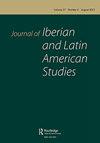博索纳罗领导下的巴西反种族主义者面临的挑战
IF 0.6
0 HUMANITIES, MULTIDISCIPLINARY
Journal of Iberian and Latin American Studies
Pub Date : 2021-05-04
DOI:10.1080/14701847.2021.1944030
引用次数: 2
摘要
我们应该如何看待巴西最近的新种族主义转向——包括总统雅伊尔·博尔索纳罗(Jair Bolsonaro)在内的高级政府官员爆发的反黑人和反土著仇恨言论,以及对过去20年多元文化共识的制度性攻击?虽然这是博尔索纳主义决心推翻过去40年社会正义改革的表现,但极右翼最近对多元文化主义的攻击,以及早先达成共识的“种族”和国家模式的崩溃,都暴露了巴西社会种族化中更深层次的潜在连续性,尤其是其阶级特征——这是黑人运动当代对平权行动议程的关注未能解决的问题。新种族主义实际上应该被理解为新自由主义计划对特定历史形式的种族资本主义的重申,而博尔索纳里斯莫被任命恢复种族资本主义,这种资本主义通常将巴西的非洲裔多数视为跨越包容和排斥边界的“边缘人口”。如果有任何重建新自由主义反对派的前景,可以对黑人多数说话,反种族主义和反资本主义的斗争必须整合,反种族主义必须成为左派的优先事项,而不仅仅是许多“社会正义”事业中的一个,而是巴西的国家问题。本文章由计算机程序翻译,如有差异,请以英文原文为准。
The Challenges for Anti-racists in Bolsonaro’s Brazil
ABSTRACT What should we make of the recent neo-racist turn in Brazil – the eruption of anti-Black and anti-Indigenous hate-speech on the part of senior government officials, including President Jair Bolsonaro, combined with institutional attacks on the multi-culturalist consensus of the last two decades? While symptomatic of Bolsonarismo’s determination to roll back the previous forty years of social justice reforms, the far Right’s recent attacks on multiculturalism and the collapse of earlier consensual models of “race” and nation have both exposed a deeper underlying continuity in the racialisation of Brazilian society, above all its class character – something the Black movement’s contemporary focus on the affirmative action agenda has failed to address. The new racism should really be understood as the Neoliberal project’s reassertion of the particular historical form of racial capitalism that Bolsonarismo was appointed to reinstate, which routinely disposes of Brazil’s Afro-descendant majority as an “edge population” straddling the frontiers between inclusion and exclusion. If there is to be any prospect of rebuilding an opposition to Neoliberalism that can speak to that Black majority, the anti-racist and anti-capitalist struggles must be integrated, and anti-racism must become a priority for the Left, not merely one among many “social justice” causes, but Brazil’s national question.
求助全文
通过发布文献求助,成功后即可免费获取论文全文。
去求助
来源期刊

Journal of Iberian and Latin American Studies
HUMANITIES, MULTIDISCIPLINARY-
CiteScore
0.40
自引率
33.30%
发文量
23
 求助内容:
求助内容: 应助结果提醒方式:
应助结果提醒方式:


